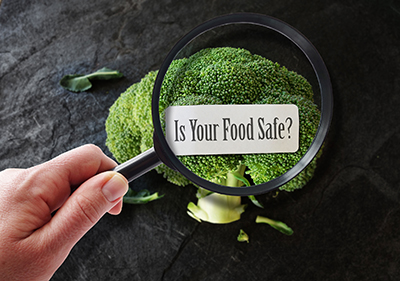Auburn Food Safety Expert Says U.S. Food Supply Not At Risk

Bob Norton, chair of the Auburn University Food System Institute’s Food and Water Defense Working Group, says the U.S. food supply is not at risk and he offers tips on how citizens can best prepare their personal food supply. Regarding U.S. and China relations, he expects many companies to move facilities out of China.
 How safe is the U.S. food supply at this time?
How safe is the U.S. food supply at this time?
The U.S. food supply is safe and food corporations are universally adopting very stringent COVID-19 prevention strategies and procedures, designed to keep sick employees out of food processing, packaging and warehouse facilities. The transportation industry is also adopting similarly rigorous standards to ensure the drivers are healthy and know how to help prevent infection by the COVID-19 virus. The retail food industry is also stepping up in this war against disease, adopting standards to protect customers and employees at the point of delivery. I am very confident that the food supply is not at risk.
For those consumers who are experiencing empty shelves in some grocery stores, my advice is to occasionally check back and find alternatives. In a recent visit to a grocery store, the freezer section for chicken was completely empty. Oddly, the nearby section containing whole chickens and frozen turkeys was virtually untouched. In that particular case, the consumer could have easily substituted baked chicken for chicken nuggets and tenders. Also, stock up on fresh fruits and produce. The canned peaches might be gone on a given day, while the produce section remains full of fresh fruits, prepared salads and fresh vegetables. A bag of rice is a great staple and a good substitution for macaroni and cheese. Block cheese is also healthy and nutritious. Use your imagination: Adapt, improvise and eat healthy!
What should the public do regarding their personal supply of food?
We live in hurricane country. As such, many people are very adept at preparing for hurricane season. In that case, the usual recommendation is to maintain a two-week food supply. That is a good idea any time, including now. If you haven’t done so already, start to do so now, but remember social distancing is essential in preventing the spread of the COVID-19 virus. Shop in non-peak hours. In a recent run to Sam’s Club for fresh fruit early Sunday evening, the number of customers was very small, and interestingly the paper aisle was full of pallets of toilet paper and paper towels. Ask at your grocery store the off-peak hours. They will tell you best time to come in and importantly, the times when deliveries to the store are made. Also, most grocery stores have a pick-up service—order online, and at pick up, they will put it in your car. Some grocery stores also have home delivery. Check around online and remember if a particular food product is not available, substitute.
Can the COVID-19 be spread in certain foods?
COVID-19 is not a food safety issue. The normal processes and sanitization procedures as codified by FDA and USDA are effective against the COVID-19 virus. Contamination of a food product at the point of delivery can occur, if for instance someone whose infected with the virus and shedding it, sneezes or coughs on that product or packaging. Treat every package and product purchased in any store as potentially contaminated. Remember the virus particle can remain infective on surfaces for hours to days under the right conditions. Be proactive! Got a box, a can or other product from the store? Sanitize the package surface. Don’t have any sanitizer? Soap and water is your best friend. Wash your hands when you come in the door, wipe down your packages, then wash your hands again. Throw away the bags used to carry your purchases from the store. These are hard to clean. They have also touched public surfaces that may have been contaminated by virus. Also be sure to wipe down your counters. They, too, can become contaminated from packaging. For fresh fruits and vegetables, sanitize them like you normally do. A thorough rinse with water helps remove surface dirt. It can also help you rinse away virus. For more information on cleaning fruits and vegetables, refer to FDA tips on its website. In all that you do, remain calm. Panic does not make you safer, but being vigilant and proactive does.
Is the situation between the U.S. and China escalating in a way that might affect agricultural products again?
The diplomatic relationship between the United States and China has deteriorated in the last few weeks, but is not completely fractured. China chose early in what was then an epidemic to obfuscate critical information that was essential for warning public health officials in other countries. This delay caused other countries to lose the advantage of early warning, making it more difficult to prepare for what now has become a pandemic. That delay in informing the world has made a difficult and challenging situation more so. That is very unfortunate and has likely caused the loss of lives that, had earlier information been available to the world, might have been saved. The diplomatic friction between the two nations is causing corporations, including those involved in food production and processing their business relationships with China. Over the medium to long-term, I expect a substantial number of U.S. corporations and other countries to “decouple,” meaning they will move their facilities out of China and modify their business relations with the country. This is likely to significantly displease China, as it will have a serious economic impact on their economy and ability to create new jobs for young people coming of working age. We were in a serious trade war with China before COVID-19 struck. I don’t expect that to subside anytime soon, unless both countries come to an agreement to set aside trade differences for the sake of public health around the world.
China unfortunately has of late begun a propaganda war, choosing instead of cooperating with the U.S. for the good of public health, to blame the U.S. military for transmitting the virus to China. This accusation is totally false and the Trump Administration has called the Chinese ambassador to the U.S., admonishing him to urge China to end this propaganda campaign. It is my hope that China will quickly modify this campaign. If it does not, the trade effects are likely to be significant, which most likely will lessen the chances of expanding exports to China. Agricultural products might be an exception, in that China has serious problems with its food supply. China has lost large portions of their swine herd to swine fever. They have also had problems in the past with avian influenza. Currently, they are very pressed to replace animal protein, which is increasingly being demanded by Chinese consumers.
About Bob Norton:
Bob Norton has 35 years of experience in veterinary infectious diseases, national security, bioterrorism and agroterrorism detection and defense. A veterinary microbiologist by training, he serves as the chair of the Auburn University Food System Institute’s Food and Water Defense Working Group and is a professor of veterinary infectious diseases, biosecurity and public health in the Auburn University College of Agriculture’s Department of Poultry Science. He is also the national security programs coordinator for The Futures Laboratory, an outreach effort to the Department of Defense. He is a long-time consultant to the U.S. military and federal and state law enforcement agencies and is editor of Bob Norton’s Food Defense Blog.
